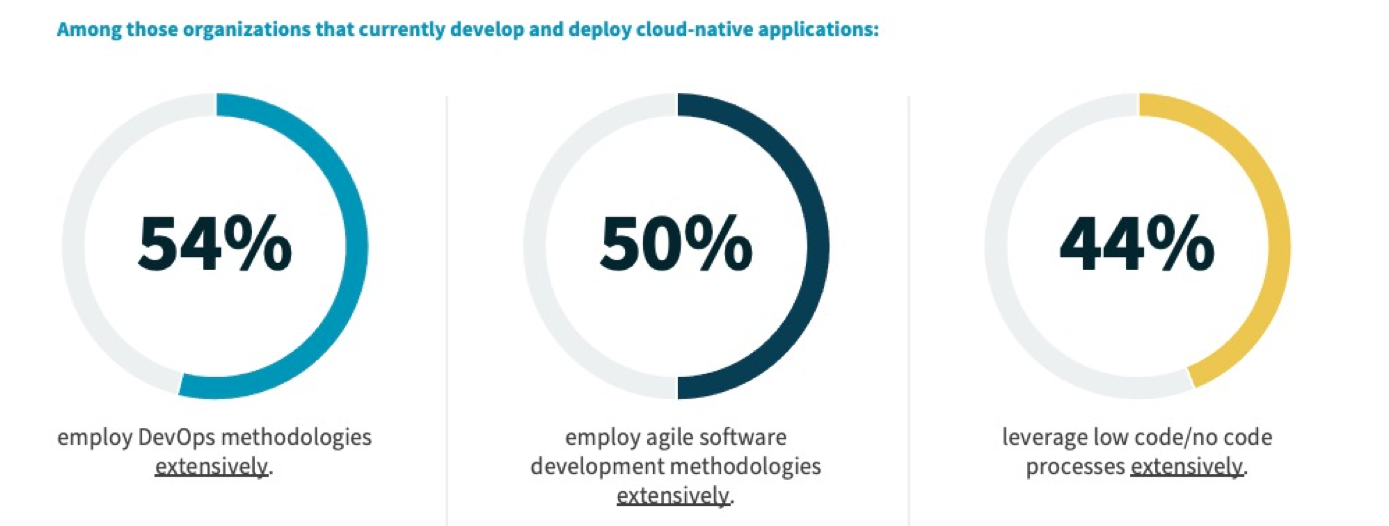The Importance of DevOps
 Rapidly responding to business objectives is critical to future-looking organizations. The adoption of DevOps is aimed at achieving business goals consistently and rapidly. DevOps is key to many organizations to increase agility and standardization of deployment. We have seen in our latest Technology Intentions Spending research survey that more than one-third of survey respondents said their organizations are extensive users of both DevOps and agile software development methodologies.
Rapidly responding to business objectives is critical to future-looking organizations. The adoption of DevOps is aimed at achieving business goals consistently and rapidly. DevOps is key to many organizations to increase agility and standardization of deployment. We have seen in our latest Technology Intentions Spending research survey that more than one-third of survey respondents said their organizations are extensive users of both DevOps and agile software development methodologies.
But DevOps is not the only factor. A modernized infrastructure is equally important, but the support, the growth, and the adoption of containers and Kubernetes are key to modern application delivery. ESG finds that more than one-third of organizations currently use containers for production applications. In addition, according to this research, we understand the following about containers:
- 29% of respondents state that their organizations use between 250 and 499 total business applications (container- and not container-based).
- 71% of respondents state that their container-based applications are or will be deployed in a hybrid method (i.e., a combination of public cloud platforms and private data centers).
- 39% of organizations state that they have run production workloads on container technology for the last 12 to 23 months.
So, how is Dell addressing the organizational challenge of DevOps, containers, and modern infrastructures? They do so by offering customers choice for their DevOps-ready infrastructure.
Understanding the Gap between DevOps, Agile, and Modern Infrastructures
First, we need to understand that the intersection between DevOps, containers, and the infrastructure must seamlessly be put in place in order to solve customer complexity and overcome challenges. To do this requires IT leaders to do the following:
- Application environments are continuously changing and becoming increasingly more diverse.
- Managing all these apps effectively requires oversight to prevent the undermining of infrastructure planning and wasteful spending (i.e., shadow IT).
- Delivering applications across the continuous integration/continuous delivery (CI/CD) pipeline is key and requires a focus on agile processes, automation, and using a DevOps methodology to build in collaboration and responsiveness.
DevOps methodologies in organizations break down the barriers between operations and engineering and implement effective, high-quality, and rapid communications that allow for speed and innovation in application delivery. Agile removes process barriers and enables developers to collaborate more closely with customers and stakeholder to accelerate delivery.
We see this with business challenges like managing IT costs and operations by simplifying and optimizing Kubernetes deployments and the AppDev (and low-code) process using DevOps-ready platforms.

Dell Technologies’ Approach: Simplified DevOps-ready Hyperconverged Systems
To deliver a modernized architecture, leveraging hyperconverged infrastructure (HCI) is a logical choice. ESG research has indicated that HCI deployments are growing across the IT ecosystem. This approach allows for tighter integration and automation as well as the flexibility to deliver the type, size, and architecture to fit the business needs.
The Dell Technologies hyperconverged infrastructure portfolio includes Dell VxRail, AzureStack HCI, and PowerFlex—all providing choice based on business need. Dell Technologies has partnered with validated reference architectures to deliver DevOps-ready solutions that are fully tested and ready to deploy in any environment.
Organizations that fully embrace DevOps practices work smarter and faster, with consistent delivery of higher-quality, revenue-generating applications to stakeholders. By fostering innovation and standardizing deployments through automation and cross-functional collaboration, Dell’s DevOps-ready HCI solutions improve the CI/CD pipeline while reducing complexity.
A recent blog by Itzik Reich, VP Technologists, Infrastructure Solutions Group at Dell introduces the new developer portal. This provides DevOps engineers the ability to script their operations to match the speed of development at scale, with control, while accelerating the process.
Paul’s POV
Change is constant, and without an agile development methodology, organizations will struggle to meet the business objectives and the customer demands. In my daily conversations with organizations, they indicate that businesses are struggling to meet these ever-changing needs. Dell provides a path to remove complexity, provide scalability and portability supporting on-premises environments, support the major hyperscalers, and address simplicity to manage the IT skills gap, but that is a topic for another blog…
Let’s talk. Contact me, and we can discuss your thoughts on this (and other) topics.







